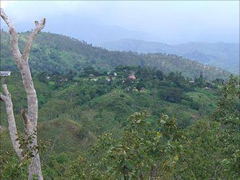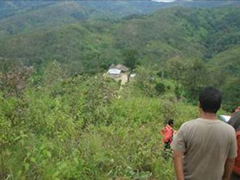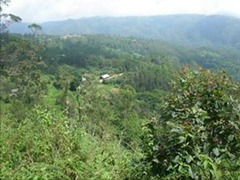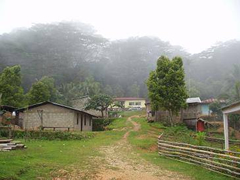
Based on information and data collected by PRA, the JICA Project Team assessed the village profiles of the four target villages, namely, Suco Faturasa, Suco Fadabloco, Suco Talitu, and Suco Madabeno, in March 2011. The village profiles were compiled in a report named “Interim Results of PRA in the Target Villages” and submitted to NDF in the end of March 2011. The major features of the target villages are introduced in this project news.
Suco Faturasa is one of the villages where the preceding JICA Study had implemented the pilot projects in 2008 and 2009. The village is located about 2 and half hours north-east from Dili.
| Strengths | Opportunities |
|---|
- The village regulations are in place and effectively being implemented.
- The suco leaders have regularly monitored the implementation of the village regulations.
- The village has the future land use map and the leaders intend to achieve the plan.
- The communities have appreciated the effectiveness of the village regulations in recovering forests and reducing disputes within the village.
- The communities have also appreciated the effectiveness of soil conservation measures.
| - The sub-district office in Remexio is planning to promote the results of Suco Fatursa, especially the effectiveness of the village regulations, to other villages in the sub-district.
- The village leaders intend to improve the village regulations to make them more effectively.
- USC-CTL plans to support the village continuously.
- The neighboring villages have also introduced the village regulations.
|
| Weaknesses | Threats |
|---|
- There is no major cash crop in the village.
- The yields of annual crops are low in general.
- Water supply is limited in the dry season.
- The road condition between Remexio and Faturasa is poor especially in the rainy season.
| - Climatic condition is unstable. (There might be a long drought or long rain.)
- The population in the village may increase drastically.
|

Suco Fadabloco is located next to Suco Faturasa but has slightly good accessibility from Dili. It is located about 2 hours north from Dili. The features of the village are similar with those of Suco Faturasa as shown below.
| Strengths | Opportunities |
|---|
- The village seems to have rather strong solidarity, especially at aldeia level.
- Every household in the village own the private land for a house and farms.
- The communities are currently practicing the rotation farming/shifting cultivation.
- The communities expect similar results/outcomes from the Project as what they have observed in suco Faturasa.
| - The sub-district office in Remexio is supportive of development and introduction of the village regulations in the village.
- The village leaders and other communities are interested in making the village regulations.
|
| Weaknesses | Threats |
|---|
- There is no village regulation in writing.
- Tara Bandu seems to be forgotten by the majority of the communities.
- The marketable products are limited.
- The yields of annual crops are low in general.
- Water supply is limited in the dry season.
- The roads from the village to the main road are not good but passable even in the rainy season.
| - The population of the village might increase drastically.
- The village regulations and future land use plan may not be able to regulate the resources in the areas owned by the communities living in Suco Asumau.
- Climatic condition is unstable.
|

Suco Madabeno is located between Dili and Aileu and about 1 hour from Dili. One of the remarkble features of the vllage is that the village has already developed the village regulations on their own initiatives in 2010.
| Strengths | Opportunities |
|---|
- The village regulations have been in place from 2010
- The village has a significant number of coffee plantations.
- There are abundant water sources in the village.
- Accessibility to Dili and Aileu is good.
| - The village leaders and other communities intend to enhance the effectiveness of the village regulations.
- The village is located between Tohumeta and Talitu.
- Demand of coffee in the international market has increased recently.
|
| Weaknesses | Threats |
|---|
- The yields of annual crops, especially maize, are low due to low soil fertility.
- They seem to intend to expand the farms for the rotation farming/shifting cultivation to secure a sufficient production of staple crops.
- Application of soil conservation measures is not still popular in the village.
- Not all communities are aware of the village regulations at present.
- The suco council has not held any regular meeting to monitor the implementation of the village regulations.
| - Climatic condition is unstable. (There might be a long drought or long rain.)
- The population in the village may increase drastically.
- Coffee plantations in the village are rather old and less productive.
|

Suco Talitu is located at the uppermost catchment of the Bemos river, which is the source of water to Dili city. Suco Talitu is the closest village among the target villages and located less than 1 hour from Dili. The area is famous for the production of industrial crops, such as coffee, clove and pepper. The major features of the village are given below.
| Strengths | Opportunities |
|---|
- Coffee and clove are extensively planted in the village.
- The communities who can earn cash income from coffee, clove, pepper and vanilla do not practice the shifting cultivation/rotation farming.
- They seem conscious of the adverse effect of wild fires on their plantations, since the plantations are the main sources of income in the village except Fatukhun.
- Some communities can still recall the rules defined by Tara Bandu.
- There are abundant water sources in the village.
- Accessibility to Dili and Aileu is good.
| - The village leaders and other communities are willing to develop the village regulations and a future land use plan of the village.
- Demand of coffee in the international market has increased recently, while demand of clove in the market seems to be stable.
- The village leaders are supportive of protecting natural resources.
|
| Weaknesses | Threats |
|---|
- There is no village regulation in writing.
- Tara Bandu is weak and seems to be forgotten by the majority of the communities.
- The area of aldeia Fatukhun is not suitable for production of clove, pepper and vanilla.
- The agricultural products in aldeia Fatukhun is limited.
- Some coffee plantations need to be rehabilitated.
| - Climatic condition is unstable. (There might be a long drought or long rain.)
- The population of the village might increase drastically.
- The economic and social disparity between aldeia Fatukhun and the other aldieas might affect the process of building a consensus among the communities.
|




